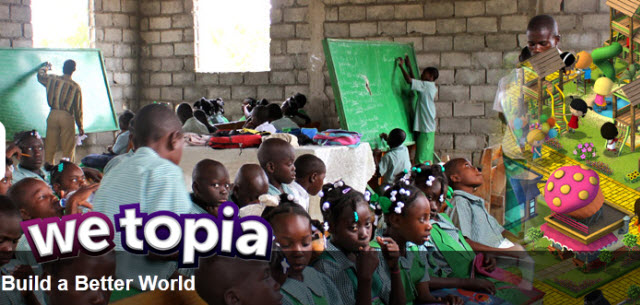
WeTopia is a free-to-play Facebook game where players create villages and help their neighbors. When players purchase virtual goods in the game, that results in a direct donation to a real world cause. Buying an in-game fountain, for instance, leads to a donation for clean water. Actual projects related to the donations have already begun in the U.S. and Haiti and will soon launch in Africa, Asia, Europe and South America.
[aditude-amp id="flyingcarpet" targeting='{"env":"staging","page_type":"article","post_id":358577,"post_type":"story","post_chan":"none","tags":null,"ai":false,"category":"none","all_categories":"business,games,social,","session":"C"}']But players don’t have even have to make purchases to to have an effect. They earn “joy” points from viewing ads from sponsors, who then make donations to nonprofits that provide children and families with basic needs, healthcare, and education in the real world.
Lexington, Ky.-based Sojo Studios has lined up an impressive number of partners, including a variety of children’s charities and celebrities such as talk show host Ellen DeGeneres.
AI Weekly
The must-read newsletter for AI and Big Data industry written by Khari Johnson, Kyle Wiggers, and Seth Colaner.
Included with VentureBeat Insider and VentureBeat VIP memberships.
Players can track their contributions inside the game through pictures, videos, blogs and in-game posts. The goal is to combine fun and tangible help, so that rewards in games are more than just a collection of points.
“With WeTopia, players can have fun with friends and family in-game, and experience the joy of supporting projects that help children in the real world. Best of all, players can see and track the progress of these real world projects,” said Lincoln Brown, founder and chief executive at Sojo Studios.
But Sojo’s WeTopia has an impressive list of partners. They include Save the Children (www.savethechildren.org), buildOn (www.buildon.org), and the Children’s Health Fund (www.childrenshealthfund.org), among others. Dave Morin, CEO and founder of Path, and tech investor Esther Dyson are advisors.
Some of the nonprofits will offer limited-edition social goods (or virtual goods) such as food stuffs or specialty shops.
“Save the Children is thrilled to be part of Sojo Studios’ innovative approach to social gaming,” said Carolyn Miles, president and CEO of Save the Children. “WeTopia will help to build awareness about important social issues and give people a fun way to make a lasting difference for children in need. Thanks to Sojo, millions of people can become important partners in the work we do each day.”
[aditude-amp id="medium1" targeting='{"env":"staging","page_type":"article","post_id":358577,"post_type":"story","post_chan":"none","tags":null,"ai":false,"category":"none","all_categories":"business,games,social,","session":"C"}']
Brand partners for Sojo include Clorox, Mattel and Dippin’ Dots. Those brands assist with the donations. Sojo itself is donating 50 percent of its net profits to nonprofit groups around the world. Sojo has about 20 employees and was founded in 2010, after the earthquake in Haiti.
Brown, the founder, had been going to Haiti for years and was there after the quake. He saw a need for improving how people could contribute to a social cause in a more sustainable way. He was inspired that so many people were playing games online, and he wanted to tie that to causes in a transparent way. The company has offices in New York and Los Angeles and has raised $8 million to date from private investors. The game has been in a closed beta test in six countries.
VentureBeat's mission is to be a digital town square for technical decision-makers to gain knowledge about transformative enterprise technology and transact. Learn More
